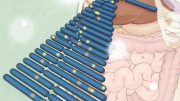
Researchers at Monash University have discovered the critical role of the protein IKAROS in immune cell development, offering new insights into cancer therapy and the potential for reevaluating existing drugs targeting this protein for improved treatment options.
IKAROS code cracked: insight into an essential protein for immune cell development and protection against pathogens and cancer.
In a scientific breakthrough that aids our understanding of the internal wiring of immune cells, researchers at Monash University in Australia have cracked the code behind IKAROS, an essential protein for immune cell development and protection against pathogens and cancer.
This disruptive research, led by the eminent Professor Nicholas Huntington of Monash University’s Biomedicine Discovery Institute, is poised to reshape our comprehension of gene control networks and its impact on everything from eye color to cancer susceptibility and the design of novel therapies.
Impact on Natural Killer Cells and Cancer Therapeutics
The study, published today (January 5) in Nature Immunology, promises pivotal insights into the mechanisms safeguarding us against infections and cancers. When the transcription factor Ikaros/Ikzf1 was deliberately obstructed, be it in preclinical models or humans, the once-mighty activity of Natural Killer (NK) cells, our immune system’s frontline warriors, plummeted. Loss of this transcription factor in NK cells resulted in widespread dysregulation of NK cell development and function, preventing their ability to recognize and kill virus-infected cells and clear metastatic tumor cells from circulation.
Aiolos/Ikzf3 and Helios/Ikzf2, related family members were found to partially compensate for the loss of Ikaros, as such when multiple IKZF-family members were inhibited, NK cells underwent rapid death. Mechanistically, Aiolos and Ikaros were found to directly bind and activate most members of the JUN/FOS family, transcription factors known for their essential roles in human embryo development and tissue function.
This discovery opens the door to the prospect of potential novel cancer therapeutics. NK cells, our first line of defense against pathogens and internal threats like cancers, could be fortified by therapies enhancing their killing prowess by targeting IKAROS and JUN/FOS biology.
FDA-Approved Drugs and Future Therapeutic Potential
Professor Huntington notes that drugs targeting IKAROS/AIOLOS have already received approval from the US Food and Drug Administration (FDA) and local Therapeutic Goods Administration (TGA) for the treatment of B cell malignancy “but until now we haven’t understood how these drugs work, armed with this new information it could be possible to develop novel drugs targeting these complexes which may offer differentiated pharmacology and therapeutic index for treating disease,” he said. Importantly on this front, Professor Huntington’s team was able to show that IKAROS had a conserved role in healthy B cells and thus potentially B cell cancers.
Reference: “IKAROS and AIOLOS directly regulate AP-1 transcriptional complexes and are essential for NK cell development” by Wilford Goh, Harrison Sudholz, Momeneh Foroutan, Sebastian Scheer, Aline Pfefferle, Rebecca B. Delconte, Xiangpeng Meng, Zihan Shen, Robert Hennessey, Isabella Y. Kong, Iona S. Schuster, Christopher E. Andoniou, Melissa J. Davis, Soroor Hediyeh-Zadeh, Fernando Souza-Fonseca-Guimaraes, Ian A. Parish, Paul Beavis, Daniel Thiele, Michael Chopin, Mariapia A. Degli-Esposti, Joe Cursons, Axel Kallies, Jai Rautela, Stephen L. Nutt and Nicholas D. Huntington, 5 January 2024, Nature Immunology.
DOI: 10.1038/s41590-023-01718-4









Be the first to comment on "IKAROS Unmasked: Major Breakthrough Unveils Protein Powering Our Immune System"